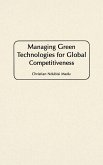Management of new technologies is a critical factor in achieving global competitiveness. A recent survey of managers in the United States revealed that the implementation of new and advanced technologies is the most popular strategy in achieving global competitiveness. This book explores the role of technology in that context. The book identifies the role of new technologies in improving quality and shows that adopting a strategic total quality management will, in fact, lead to improved productivity and survivability of the firm. A thorough comparison of the Japanese and American production management practices is presented. This in-depth analysis helps to identify the problems of managing new technologies and shows that human resources management is a critical factor that should not be overlooked. Other strategies for improving global competitiveness are presented. Each of the five sections of the book deals with a major thrust that confronts management of new technologies. The book also discusses information system management and product design. The book uses real-life cases, models, and conceptual frameworks to support the views presented. Productivity, quality, and competitiveness are all related to technology. The success of Japanese corporations in achieving quality management has impelled the U.S. executives to listen and re-evaluate their management practices. Increasingly, many managers believe that new, advanced technologies can contribute to improving the productivity, quality, and competitiveness of a firm. However, simply adopting a new technology will not put an end to productivity and/or quality problems. This fact is most apparent in the case of computer-integrated manufacturing. The islands of automation that have resulted convinced many that effective management of new technologies is necessary in order to exploit any potential benefits. This book focuses on efficient management techniques and looks at the critical areas that can enhance the performance of a firm as a result of the adoption of new technologies. The book is divided into five sections: The total quality management section contains four chapters that present a comparison between the Japanese and American production practices. This section also presents a new way to measure the performance of a firm---not just by the direct quality of the product or service produced, but also by the sensitivity and responsibility of the firm to environmental and greening issues. The selection and implementation of new technologies section discusses the problems associated with the cost-accounting techniques in justifying new technologies and uses a multicriteria decision framework to show how this decision could be made. The strategic management section presents issues on production innovation and performance; The knowledge-based techniques section investigates the role of artificial intelligence and expert systems in the management of new technologies. Finally, the product design and inventory management section discusses the role of product design and reduced lot sizes in achieving a competitive advantage.
Hinweis: Dieser Artikel kann nur an eine deutsche Lieferadresse ausgeliefert werden.
Hinweis: Dieser Artikel kann nur an eine deutsche Lieferadresse ausgeliefert werden.








